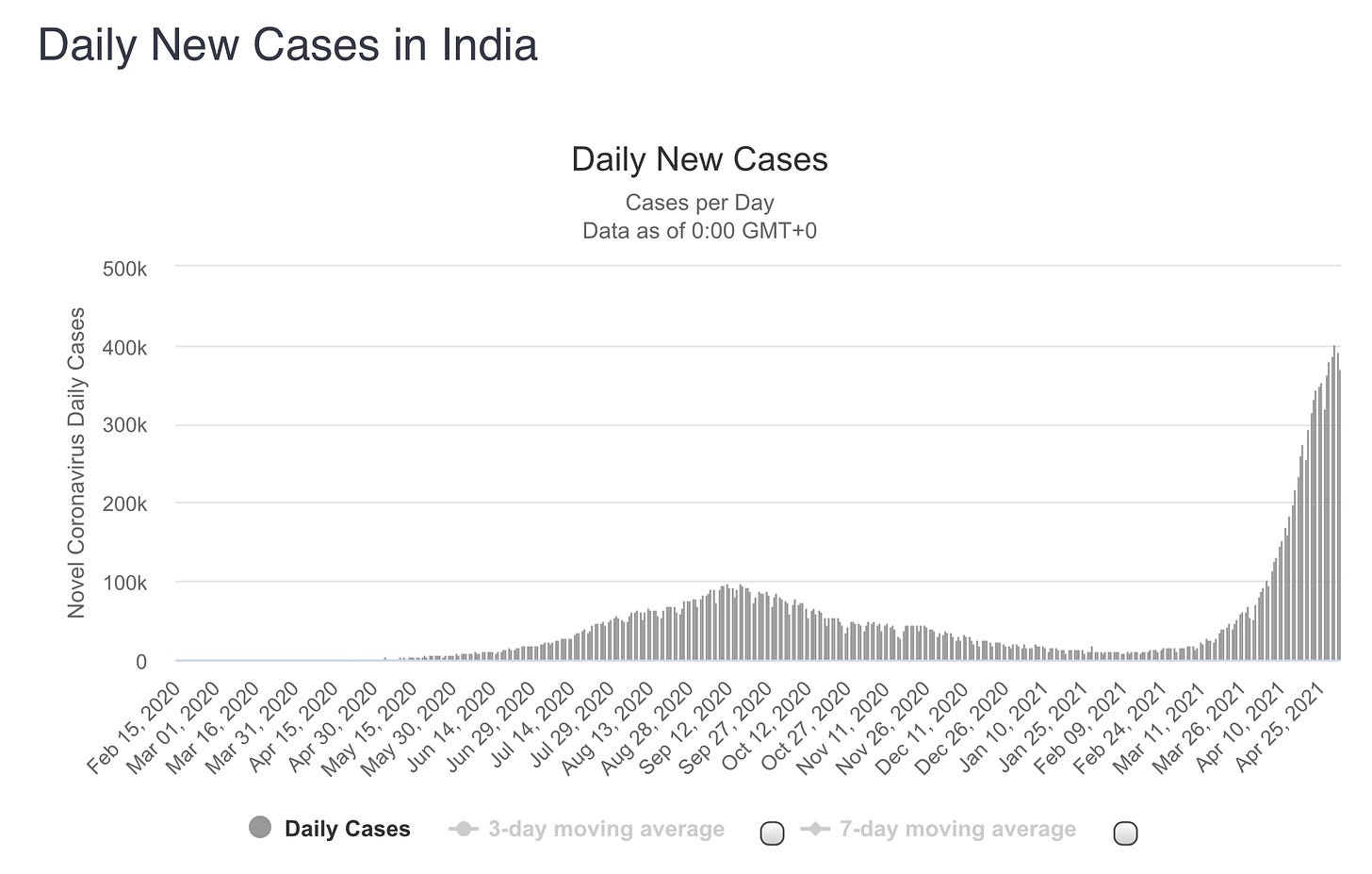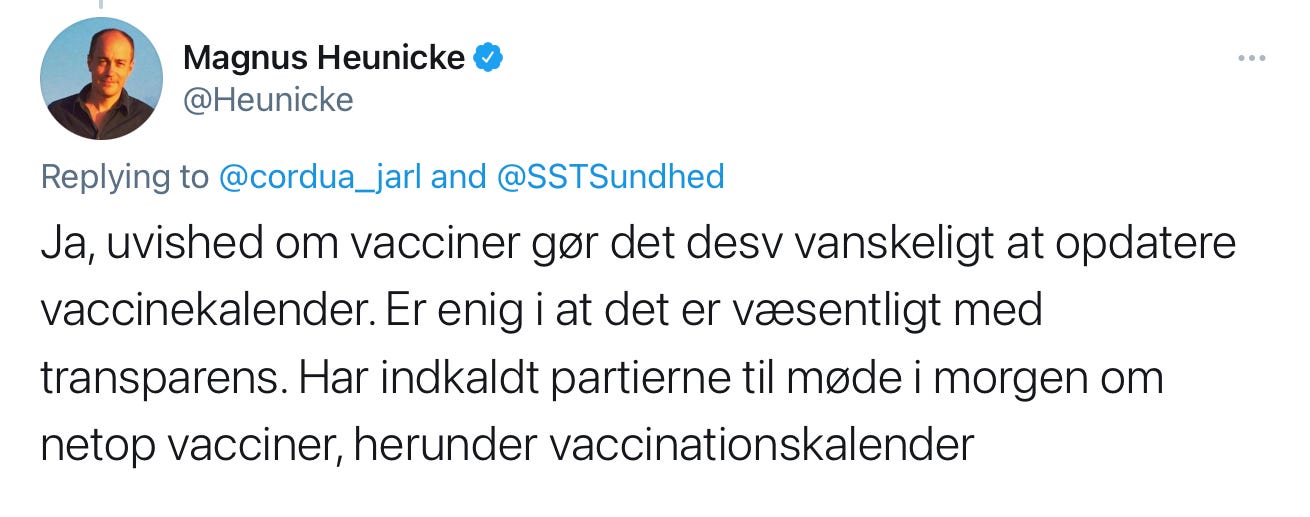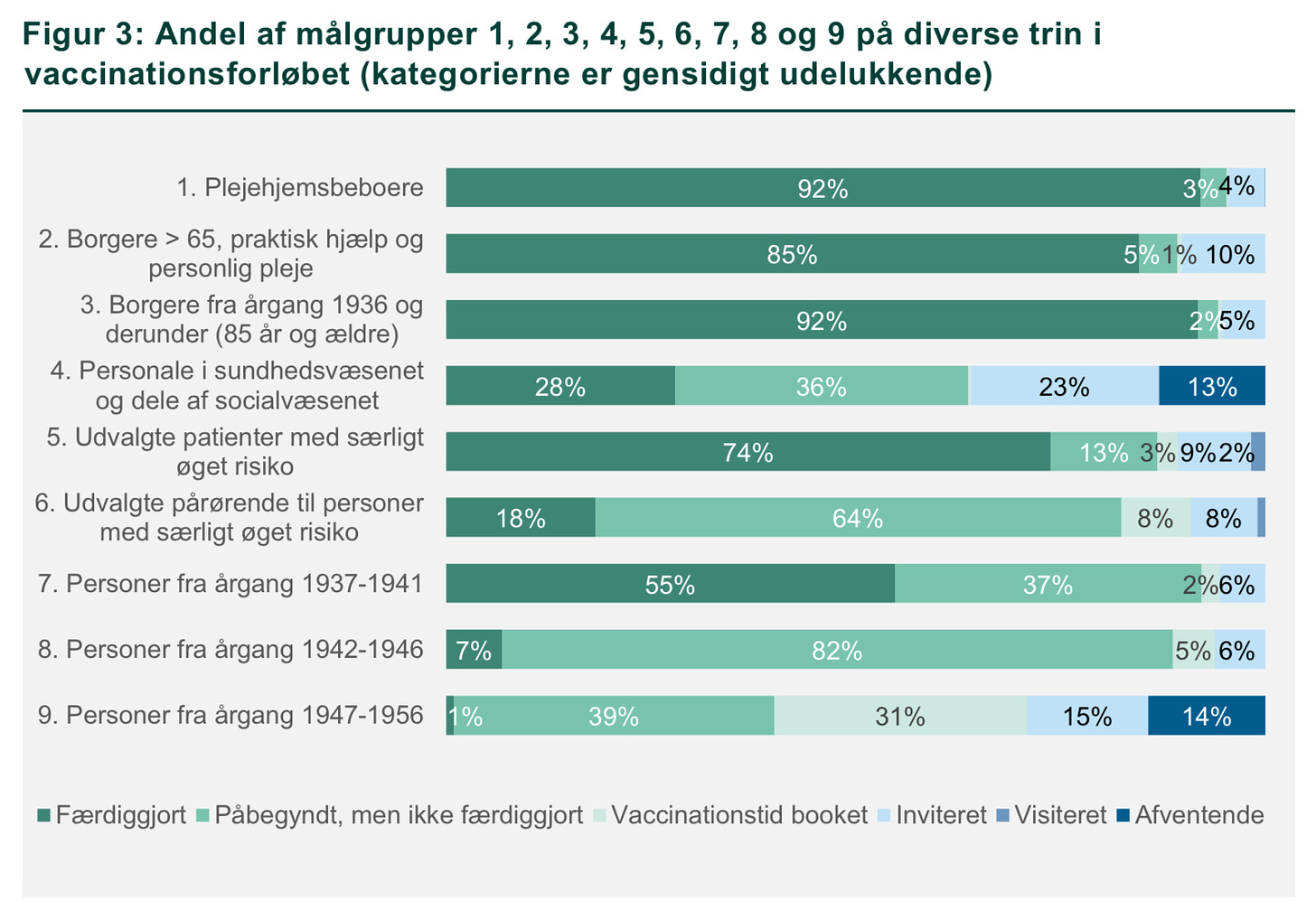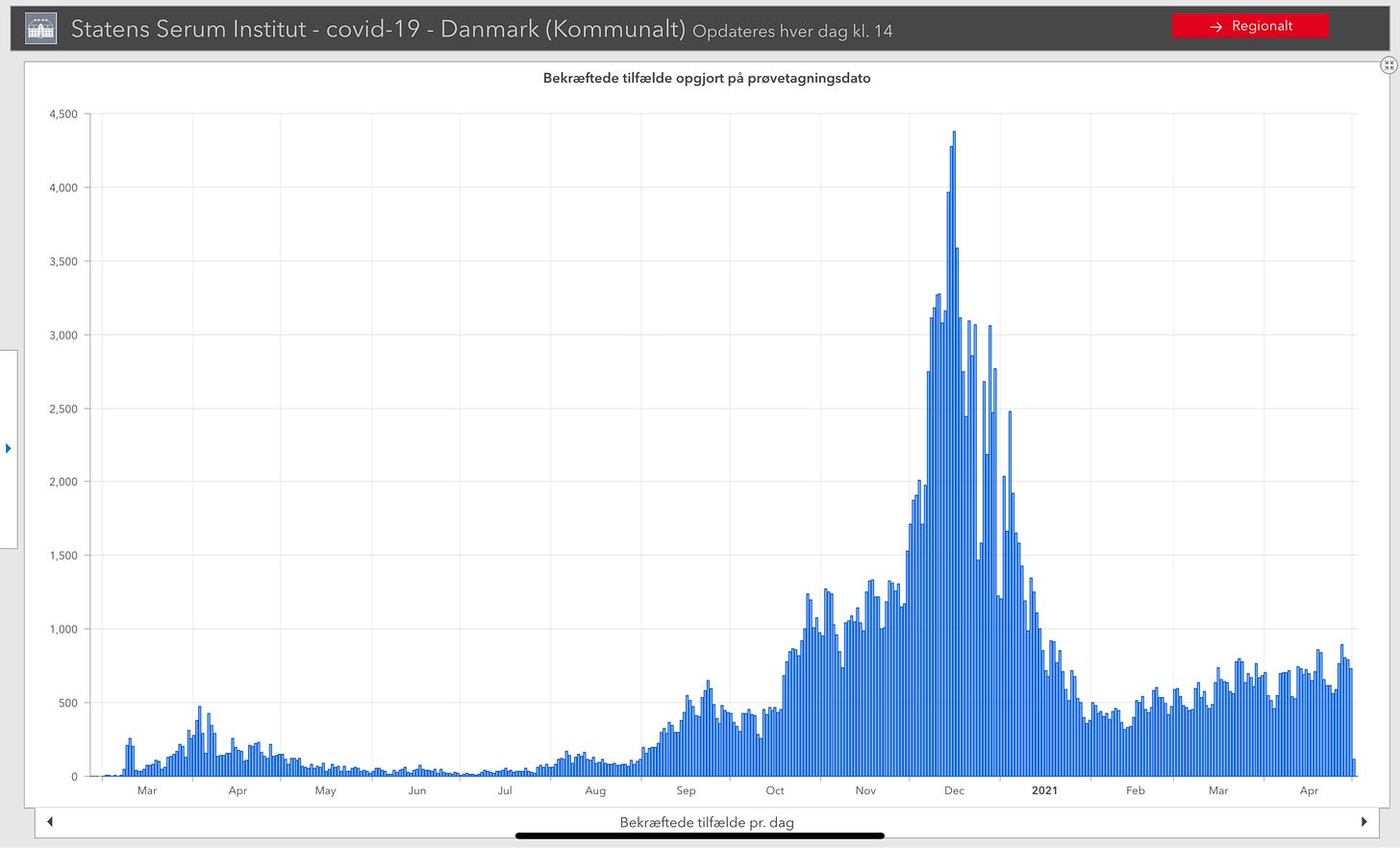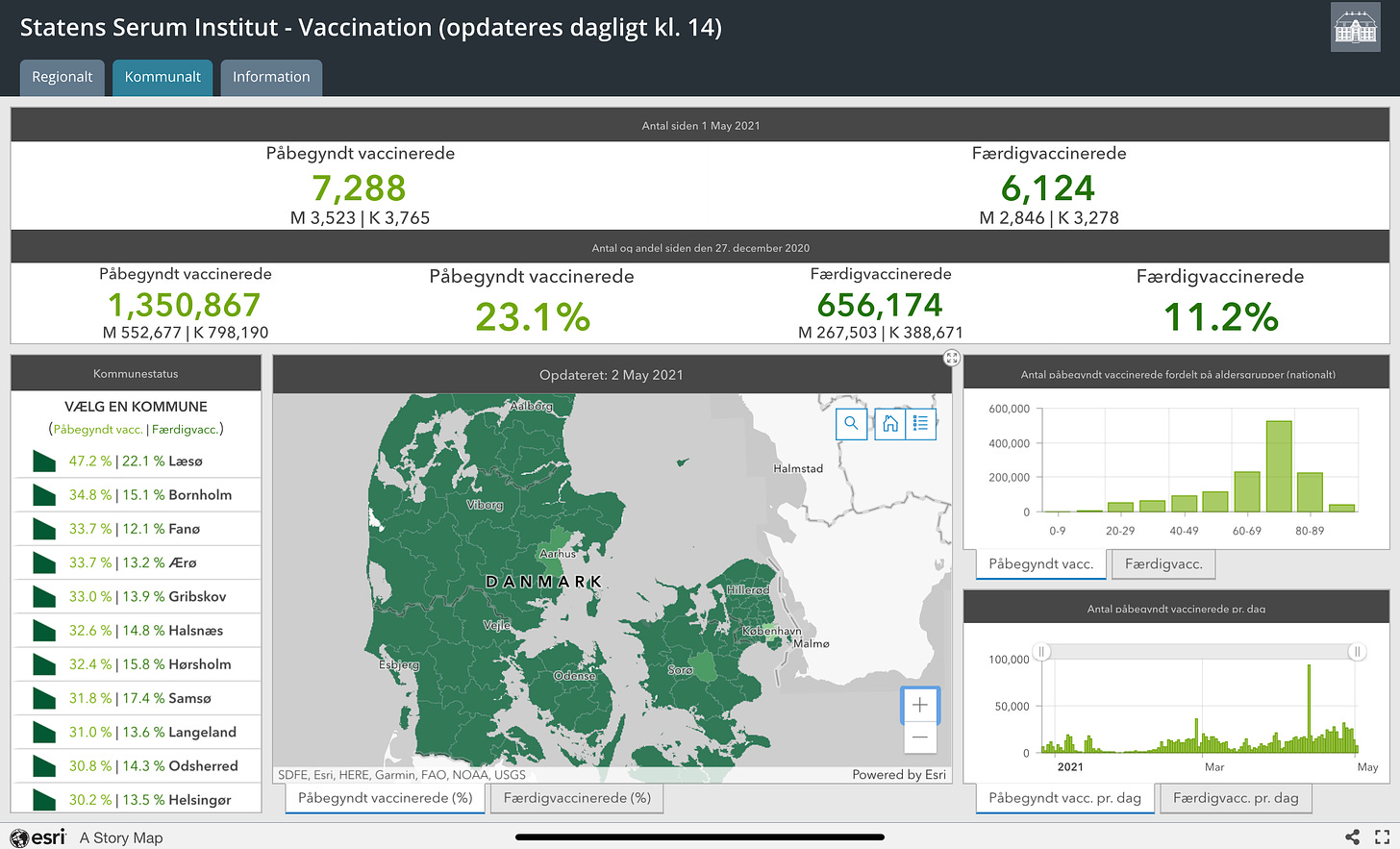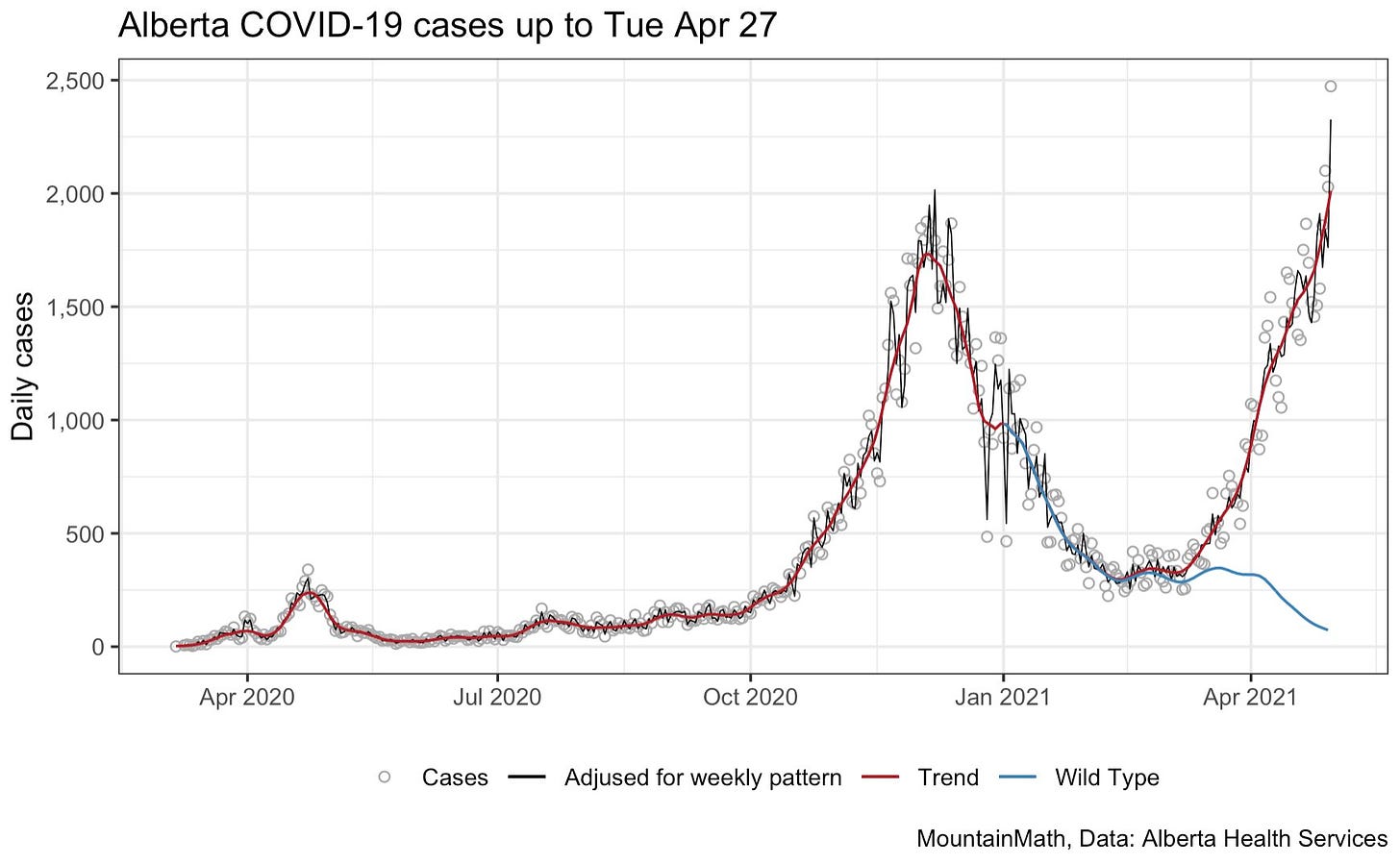Monday Morning News & Notes
🇩🇰🇮🇳
Denmark is sending emergency medical aid to India as it continues to be hit with a horrific infection wave that has maxed out hospital capacity and exhausted the ability of crematoriums to keep up with the sheer number of bodies. 53 respirators to help treat COVID patients are on their way. Denmark is also giving one-million euros to the Indian Red Cross to help fight the pandemic.
The money being sent to the Red Cross will be used for ambulance services, the purchase of protective gear, and for information campaigns to battle misinformation.
Danish Foreign Affairs Minister Jeppe Kofod:
“In India, we see how horrible, how violent and how heartbreaking the COVID pandemic can hit. Denmark will, of course, help where we can. I am incredibly happy that we can now offer respirators to India which the Indian authorities have confirmed match their needs. We are constantly looking at other options and talking to India about others avenues of support.”
The Ministry of Defense, together with the Danish Emergency Management Agency, will arrange the transport of the respirators to India.
India is still recording the highest infection rates in the world including a record high 402,110 infections going into the weekend. That is the highest single daily accumulation of new infections of any country in the world on any day of the pandemic to date.
🇩🇰
On Saturday, Denmark eased COVID travel restrictions making it easier for those who are fully vaccinated to move around the E.U. The requirement that a negative COVID test prior to boarding a flight to Denmark be no more than 24 hours old, has been increased to 48 hours.
If you missed it you can read all the details in our previous post on Informeret HERE.
-
Denmark’s Health Minister Magnus Heunicke says he has summoned the parties to a meeting today to discuss the vaccination campaign and the vaccination calendar. It has been over two weeks since the National Health Board has updated the vaccine calendar, something that usually happens every week. Heunicke says “uncertainty” about vaccines is making updating the calendar difficult but “transparency is essential.”
Use of the one-shot Johnson & Johnson vaccine remains suspended in Denmark and a decision on its fate should be made this week.
-
Denmark is getting closer to opening up vaccinations for the general public. Currently the focus is on nine target groups covering seniors in care homes, seniors receiving care in their own homes, vulnerable populations, frontline health workers, and people over the age of 65.
National Board of Health Director Søren Brostrøm says vaccinations for the nine priority target groups is almost complete.
"The roll-out of the vaccination is going really well, and now the majority of people over the age of 65 have been offered a vaccination. We can see in our data that 71% of them have been vaccinated or have booked an appointment and will be vaccinated soon. It is an important milestone that we can start rounding up the vaccination efforts of the first nine target groups and start offering vaccinations to the broader population.”
Brostrøm says the results of the vaccination campaign are now evident.
“We are beginning to see that there are much lower infection rates among the oldest age groups, and we attribute this to the fact that a large proportion of them have been vaccinated. At the turn of the year the infection was most prevalent among those 80 years old and older. Now that more than 90% of this age group has been vaccinated, we can see that it is the age group where there are the fewest new infections.”
He says new infections are now almost exclusively concentrated among younger age groups, the group yet to be vaccinated.
-
Denmark added 2,358 total COVID infections since Thursday’s update while losing another seven lives to the coronavirus. There were 874 infections reported Friday, 617 on Saturday, and another 867 yesterday. As you can see the overall trend continues to see the infection curve gradually rising.
On the vaccination front to date, 1,350,867 1st dose vaccinations (23.1% of the population) have been administered while 656,174 people (11.2%) are now fully vaccinated.
Yesterday there were a mere 13,412 total vaccinations done.
-
And then there was one: Jerne parish in Esbjerg Kommune has been locked down after passing the COVID thresholds, triggering an automatic shutdown. It has an infection incidence rate per 100,000 people of 545, with 55 new infections, and a positivity percentage of 2.6%. It is currently the only municipal district in Denmark under a lockdown.
-
It looks like Mother Nature may be our secret weapon to keep infection rates down and buy time to get everyone in Denmark vaccinated. University of Copenhagen Professor Emeritus of Epidemiology Thorkild Sørense told Ritzau that sunny warmer weather means more people are outside.
“There are many indications that if you are outside, there is virtually no risk of infection, because the amount of virus in the air is diluted.”
🇳🇴
Over the long weekend, the Norwegian Institute of Public Health extended the gap between 1st and 2nd doses of mRNA vaccines from six to 12 weeks. The institute cites studies showing a longer duration of antibodies after a first dose as the basis for making the decision.
Infection Control Director Geir Bukholm:
“Since the first dose provides very good protection against COVID, we believe that it is right to ensure that as many people as possible receive the first dose as early as possible. By extending the dose interval by six weeks, far more people will receive the first dose earlier.”
The extension of the gap between doses comes into effect today but it is not retroactive for those who have already had a first shot of the Pfizer or Moderna vaccine. They will remain on the original six week timeline. The longer gap between doses will apply to people under the age of 65 who have no underlying health conditions.
-
Norway takes the first step in adopting a vaccine passport this week. Ahead of a fully functioning digital vaccine passport arriving at the end of June, Norwegians will now be able to show their vaccination status and last test result online via their smartphone.
Late last week the Norwegian Institute for Public Health awarded a contract to NetCompany to work on the final product. The company will work with Norwegian Directorate of Health in close collaboration with NIPH, the Norwegian Health Network and the Norwegian Directorate for e-Health. While NetCompany will work on the vaccine passport app it will have a special focus on how to validate the corona certificate, kind of like a digital lock and key linking vaccination status to a person’s identity.
🇪🇺
The European Medicines Agency has received an application to expand the use of an immunosuppressant medication to include hospitalized COVID patients on a ventilator. The EMA will now evaluate Olumiant to see if it warrants use and render a decision. The application suggests the medication, which helps battle inflammation, could help reduce tissue damage associated with COVID infections.
The EMA will make a final decision on whether or not to approve the medication for use on COVID patients in July.
🇨🇦
Ontario added 10,988 infections since Thursday’s update. 3,887 on Friday, 3,369 on Saturday, and another 3,732 yesterday.
Starting today, anyone 18 years old and older living in any area of Ontario deemed a hot spot can book a vaccination appointment. Ontario is diverting half of its vaccine doses to those hot spot areas. As of Thursday, everyone 50 years old and older throughout the rest of the province will be able to begin booking vaccination appointments.
Alberta has tightened COVID restrictions after new infections surged over the 2,000 mark last Thursday and hit a record breaking 2,433 infections on Saturday as active cases hit a record high and hospitalizations climb. Junior and Senior high schools have been closed, as have fitness centers, and a curfew has been imposed on hot spot areas.
(Graph courtesy of Jens von Bergmann at MountainMath)
🦠
A European study published in The Lancet has found that countries adopting a COVID zero approach, a strategy of eliminating the virus, as opposed to mitigating it, resulted in better across the board outcomes. The study found “COVID deaths per 1 million population in OECD countries that opted for elimination (Australia, Iceland, Japan, New Zealand, and South Korea) have been about 25 times lower than in other OECD countries that favoured mitigation.” It also adds countries opting for mitigation strategies also need to factor in the impacts of long COVID, the healthcare burden of dealing with those who have coronavirus related issues for months after recovery.
It is not just deaths either. The study found countries adopting a COVID zero approach also saw by far the fastest economic recovery. In five countries using an elimination strategy, GDP growth returned to pre-pandemic levels early this year. The other 32 OECD countries using mitigation are still seeing negative growth.
According to the study, swift harsh lockdowns used in efforts to completely eliminate the virus also resulted in a much shorter impacts on civil liberties. Countries that used mitigation continue to struggle with restrictions on civil liberties.
The study concludes, “Countries that opt to live with the virus will likely pose a threat to other countries, notably those that have less access to COVID-19 vaccines. The uncertainty of lockdown timing, duration, and severity will stifle economic growth as businesses withhold investments and consumer confidence deteriorates. Global trade and travel will continue to be affected. Political indecisiveness and partisan policy decisions reduce trust in government. This does not bode well in those countries that have seen a retraction of democracy. Meanwhile, countries opting for elimination are likely to return to near normal: they can restart their economies, allow travel between green zones, and support other countries in their vaccination campaigns and beyond.”
💉🇺🇸
A study of ‘real world’ vaccine data in the United States published by the U.S. Center for Disease Control and Prevention found both the Pfizer/BioNTech and Moderna vaccines to be highly effective. The study of real world data across multiple states found both vaccines were 94% effective in preventing hospitalization among all fully vaccinated adults. For those with just one dose, the vaccines were 64% effective for those 65 year old and younger. The study concludes that with the significant reduction of hospitalizations for people with one or both doses there are likely commensurate reductions in fatalities and post-COVID conditions.




